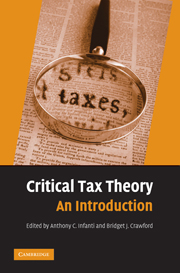Book contents
- Frontmatter
- Contents
- List of Illustrations
- List of Tables
- List of Contributors
- List of Common Abbreviations
- Introduction
- CHAPTER 1 FOUNDATIONS OF CRITICAL TAX THEORY
- CHAPTER 2 HISTORICAL PERSPECTIVES ON TAXATION
- CHAPTER 3 THE GOALS OF TAX POLICY
- CHAPTER 4 CRITICAL TAX THEORY MEETS PRACTICE
- CHAPTER 5 RACE AND TAXATION
- CHAPTER 6 GENDER AND TAXATION
- CHAPTER 7 SEXUAL ORIENTATION AND TAXATION
- Same-Sex Couples and the Federal Tax Laws
- The Internal Revenue Code as Sodomy Statute
- Heteronormativity and Federal Tax Policy
- Death Taxes: A Critique from the Margin
- Homo Sacer, Homosexual: Some Thoughts on Waging Tax Guerrilla Warfare
- CHAPTER 8 THE FAMILY AND TAXATION
- CHAPTER 9 CLASS AND TAXATION
- CHAPTER 10 DISABILITY AND TAXATION
- CHAPTER 11 GLOBAL CRITICAL PERSPECTIVES ON TAXATION
- CHAPTER 12 CRITICAL PERSPECTIVES ON CRITICAL TAX THEORY
- Index
Heteronormativity and Federal Tax Policy
Published online by Cambridge University Press: 04 August 2010
- Frontmatter
- Contents
- List of Illustrations
- List of Tables
- List of Contributors
- List of Common Abbreviations
- Introduction
- CHAPTER 1 FOUNDATIONS OF CRITICAL TAX THEORY
- CHAPTER 2 HISTORICAL PERSPECTIVES ON TAXATION
- CHAPTER 3 THE GOALS OF TAX POLICY
- CHAPTER 4 CRITICAL TAX THEORY MEETS PRACTICE
- CHAPTER 5 RACE AND TAXATION
- CHAPTER 6 GENDER AND TAXATION
- CHAPTER 7 SEXUAL ORIENTATION AND TAXATION
- Same-Sex Couples and the Federal Tax Laws
- The Internal Revenue Code as Sodomy Statute
- Heteronormativity and Federal Tax Policy
- Death Taxes: A Critique from the Margin
- Homo Sacer, Homosexual: Some Thoughts on Waging Tax Guerrilla Warfare
- CHAPTER 8 THE FAMILY AND TAXATION
- CHAPTER 9 CLASS AND TAXATION
- CHAPTER 10 DISABILITY AND TAXATION
- CHAPTER 11 GLOBAL CRITICAL PERSPECTIVES ON TAXATION
- CHAPTER 12 CRITICAL PERSPECTIVES ON CRITICAL TAX THEORY
- Index
Summary
INTRODUCTION
The proponents of same-sex marriage demand equal marriage rights as a matter of fundamental human dignity and as a means to gain certain legal benefits that attach to marital status. When they enumerate the benefits of marriage, the proponents invariably place the ability to file joint federal income tax returns near the top of the list, followed by inheritance rights, pension and survivor benefits, and decision-making authority in the case of disability. However, for anyone familiar with the recent congressional debate over the “marriage tax penalty,” characterizing joint filing status as a “benefit” seems to be at best ill-informed and at worst just plain wrong. After all, everyone knows that the Code is anti-marriage.
To the contrary, I believe that this assertion by same-sex couples reveals three points that may not be obvious to tax scholars. First, from their vantage point, same-sex couples can see that the joint filing provisions are just one example of a scheme of taxation where considerations of marital status are pervasive. Accordingly, the risk of a marriage penalty may be overstated because the narrow focus on the marriage penalty ignores the numerous other provisions of the Code which reference a taxpayer's marital status. Second, the provisions governing family taxation are prescriptive in nature. They are designed to recognize and privilege a specific type of relationship. Thus, for some same-sex couples, the risk of a marriage penalty may be offset by the value of official recognition. Finally, the stance of the opponents of same-sex marriage highlights another very important point. Any discussion of sexual orientation and/or marriage implicates difficult and divisive questions of morality.
- Type
- Chapter
- Information
- Critical Tax TheoryAn Introduction, pp. 200 - 207Publisher: Cambridge University PressPrint publication year: 2009
- 2
- Cited by



